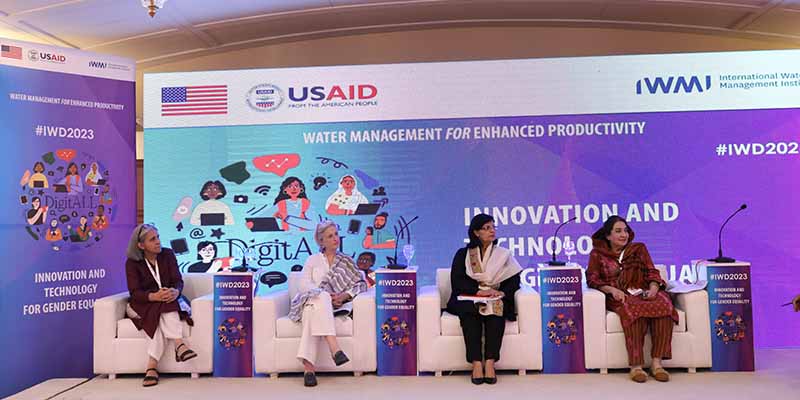‘The International Water Management Institute (IWMI) highlights the need for women inclusivity in all aspects of technology and water management.’
Wednesday 08 March 2023, Islamabad: International Water Management Institute (IWMI) Pakistan celebrated International Women’s Day 2023and held a seminar and panel discussion under the global UN theme ‘Innovation and technological change, and education in the digital age for achieving gender equality’ in Islamabad. The commemoration on this International Women’s Day 2023 by IWMI was to raise awareness for inclusivity, technology incorporation and celebrate the Pakistani woman.
IWMI through USAID funded activity Water Management for Enhanced Productivity (WMfEP) works on improving the livelihood and enriching the lives of women in the Khyber Pakhtunkhwa province.As women constitute majority of the workforce in agriculture, their role in the food security of Pakistan is important.The total labor force engaged in agriculture in Pakistan is 37.4 %. Among this agriculture labor force, 67.9 % are women. Their involvement in agricultural policies and programs continues to be largely overlooked.
Women farmers have shown a keen interest in acquiring skills in livestock management and growing vegetables in their houses. Through WMfEP activity, women water professionals have been provided opportunities to participate in various technology transfer and capacity building trainings to progress their careers, enrich their lives and contribute in the development of their community. Women from all segments of society, from home owners, farmers,academia, researchers and livestock herders, have accelerated their development and skills by incorporating technology in their daily lives.
Dr.MohsinHafeez, Country Representative-IWMI Pakistan, shared that ‘women play a significant role in crop production. Half of the food produced in the developing world is due to the contribution by women’.

Dr. Mark Smith, D.G. IWMI, in his statements declared that 132 women have been engaged in various interventions under WMfEP. He also stated that ‘the target beneficiaries of WMfEP include the local population particularly women and youth in the province of Khyber Pakhtunkhwa, Pakistan and specifically the GomalZam Dam command area in the two districts of Dera Ismail Khan and Tank’.
Mr. Muhammad Nawaz, Development Specialist (Water Resources Management) USAID Mission Pakistan, said that ‘we need to seriously create institutional framework for regulating ground water so that if there is a drought, then we should have sufficient ground water.’
Dr. Muhammad Israr Khan, Secretary Agriculture, Khyber Pakhtunkhwa, in his speech highlighted the need of incorporating technology in agriculture by adding ‘we should prudently develop our simulation modelling and look into futuristic aspects of climate to train our researchers and foresters regarding the types of vegetation and breed of livestock able to tolerate and sustain adverse atmospheric conditions.’
The chief guest Mr. Steven Rynecki, Director Climate and Sustainable Growth Office, USAID Mission Pakistanemphasised the role of technology by stating ‘we are using technology to try and make improvements in human capacity development, through training, through education but also through opportunities like today. Putting awareness around what can digital do to improve the lives and livelihoods of Pakistan especially women and girls.’
A comprehensive panel discussion regarding the role of women engagement through digital innovation and technology transfer for an inclusive and equitable food system was conducted.Synergy between the government, academia and private sector was stressed to improve food security, deliver resilient water solutions and create a sustainable development future.
The Panelists included:
Dr.SaniaNishtar – Senator Govt of Pakistan & former Federal Minister
Ms. Florence Rolle – UN FAO Representative in Pakistan
Dr.RiffatSardar – Chairperson KP Commission on the Status of Women
Ms. Sophia Hasnain – CEO Linked Things
The seminar showcased achievements by women water sector professionals and farmers through a walking photo gallery. The beneficiaries at the seminar shared their story and experience of incorporating technology for resource development, sustainable water managementand social economic development of their area.


Comments are closed, but trackbacks and pingbacks are open.